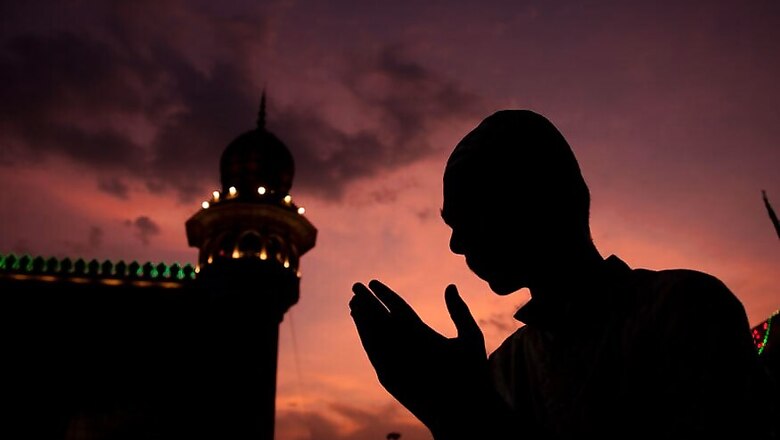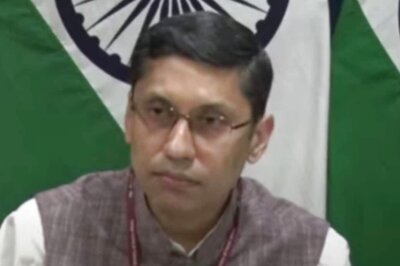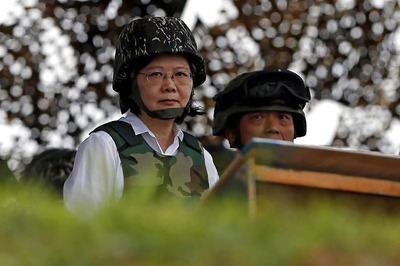
views
There is a global struggle to try and define who or what constitutes an acceptable Muslim. Largely speaking, the war on terror has defined this discourse.
Both Muslims and non-Muslims often go to great lengths to show how their particular understanding of Islam is the most authentic. Therefore, today many politicians have realised that it is simpler to try and co-opt certain sects of Muslims in the fight against ‘global terror’, rather than wage a war indiscriminately against all Muslims.
In the aftermath of 9/11 and the wars in Afghanistan and Iraq, politicians around the world have not only gone around repeating platitudes about Islam being a religion of peace, but have increasingly also sought to define which Muslim school of thought, sect or group represents or embodies ‘true Islam’.
In particular, it is the Sufis who are hailed somehow for being “more than just Muslim” or in some cases, as the former governor of New York David Paterson said, “not really Muslim at all”.
“They are almost like a hybrid, almost westernised. They are not really what I would classify in the sort of mainland Muslim practice.”
Indeed, even some Muslim leaders espouse the cause of Sufism as an antidote to militarised extremism. Former speaker of the Syrian Parliament Mohammad Jihad Al-Laham argued for the state sponsorship of Sufism and in Algeria, president Abdelaziz Bouteflika’s patronage of certain zawiyas or Sufi centres has been perceived as a way of extending political patronage in return for loyalty.
Across the world, there is an increasingly large number of politicians and intellectuals who see ‘traditional Islam’ as resolutely anti-West, anti-Semitic, anti-Christian and anti-modern, amongst other things.
However, Sufism or ‘mystical Islam’ is seen as transcending its ‘Islamic-ness’ because it benefited from Christian and ‘Western’ influences that make it more apolitical, tolerant, syncretic and less orthodox.
Nobody is a better example of this than the famous 13th century mystic and poet Maulana Rumi. Across the world, Rumi is seen as the example of a ‘humanist’ who represented ‘universal values.’ His most famous work, named the Masnavi, has been translated into dozens of languages and regularly features on bestseller lists, even in America of all places.
Of course, in translation much of what he alluded to through language is lost. There is no doubt that Rumi sought to transcend worldly identities, but an analysis of his poetry in the Persian original shows that his work is rooted in and embedded with Quranic verses and allusions to ahadith or Prophetic sayings.
By reading Islam out of Rumi, people are not only fundamentally undermining the power of an important intellectual tradition within Islam, but are also doing injustice to the fact that an appeal to transcend superficial religious identity can emerge from within orthodox tradition.
This tendency to secularise Sufism is something that goes back to 18th century Europe, if not earlier, where people sought to decouple Islam from mysticism. This form of what Omid Safi calls ‘spiritual colonialism’ stands to cause immense damage to an orthodox tradition that has often been at the vanguard of fighting divisive and sectarian forces.
The secularisation of Sufism is not just an increasingly visible trend in the West, but in India too, both Sufism, as well as Shi’ism, are singled out for being ‘more Indian’ or at least for having roots in Indian traditions and cultures.
Recently, on a state visit by King Abdullah of Jordan, the Indian government organised a conference where people from a number of different sects were in attendance, including Sufis, Shias, Salafis, Deobandis, Barelvis and others.
Both King Abdullah and the Prime Minister advocated for a more ‘moderate Islam’ and stressed that the fight against radicalisation is not against any one sect.
It is unclear, as I have argued elsewhere, whether the moderation they preach about is meant to manifest itself in moderate political views or in moderation in devotion, piety and practice.
What is clear is that there is a concerted effort by the BJP and indeed the RSS to try and co-opt Sufism and Shi’ism in particular, in this fight against terror.
The Muslim Rashtriya Manch (MRM), a wing of the Rashtriya Swayamsevak Sangh (RSS), has consistently sought to conduct outreach among Shias and Sufis in a bid to remove the perception that the RSS is fundamentally against Muslims and Islam.
At the World Sufi Forum in 2016, Prime Minister Modi said, “Sufism is the celebration of diversity and pluralism. Sufism blossomed in India's openness and pluralism. It engaged with her spiritual tradition and evolved its own Indian ethos.”
On the face of it, there is nothing really to disagree with in the Prime Minister’s statement, but the shift in rhetoric from seeing Islam as fundamentally foreign to India to advocating Sufism as something that partly emerges from and merges into India is noticeable.
Indeed, to this day, although the Prime Minister and the MRM might be advocating the cause of “acceptable Muslims”, there are others in the BJP and the RSS such as Sangeet Som, a legislator in Uttar Pradesh, and UP Chief Minister Yogi Adityanath who still toe the line that all Muslims are anathema to their vision of India.
This almost schizophrenic approach is perhaps partly explained by the fact that the compulsions of office ensure that the Prime Minister has to speak in different registers in order to appear inclusive. His other party members, on the other hand, are able to use Islamophobic rhetoric in order to consolidate their politics, which has essentially always defined itself by invoking the spectre of Islam as well as Christianity and Communism.
This view was articulated by the founders and ideological progenitors of the RSS, an organisation that the Prime Minister has been a part of for longer than his political career.
MS Golwalkar (1906-1973), the second sarsanghchalak or head of the RSS, which provides ideological direction to the BJP, wrote about Indian Christians and Muslims that “they are born in this land, no doubt. But are they true to its salt?... No.”
He goes on to say: “They (Muslims) have also developed a feeling of identification with the enemies of this land. They look to some foreign lands as their holy places. They call themselves Sheikhs or Syeds… They still think they have come here to conquer and establish their kingdoms. So we can see that it is not merely a case of change of faith, but a change even in national identity. What else is it if not treason, to join the camp of the enemy leaving behind the mother nation in the lurch?”
The change from seeing all Muslims as potential fifth columnists to identifying those who “belong” to India is not just a small shift but indeed must be seen as a strategic and politically significant move.
For example, the entire effort at ghar wapsi, literally ‘the return home to Hinduism’, of those Muslims who are believed to have converted over the course of many centuries is a part of this plan. The question that must be asked then is why is there suddenly a differentiation between Muslims who might be true to their country’s “salt” and those who might not?
By projecting Sufis and Shias as acceptable Muslims because of their ‘heterodox’ cultural practices, the BJP is tapping into and taking advantage of an existing set of intra-Muslim polemics. Certain Sufi and Shia practices, such as visiting of the graves of Sufi saints or the mourning of the martyrdom of the Prophet’s grandson Imam Hussain, are criticised by other Muslims as deviant.
Indeed, part of the polemics against these practices is precisely that they are foreign — often Hindu — cultural accretions that must be purged. These rituals are seen to encourage polytheism and somehow dilute the ‘unity’ of God.
Conservative opposition to Sufis and Shias hold that it is precisely these inauthentic practices that led to the decline of Muslim authority. Therefore, the alignment of Sufis and Shias to political power will only serve to make this criticism seem more valid.
There is no doubt that this kind of intra-Muslim sectarianism and its attendant polemics have caused much disunity and discord among Muslims. However, it must be remembered that Sufi and Shia identities are being politicised because they are seen as potential supporters in the ‘war on terror’ and not because of any theological merits. All that is happening is that their religious identities are being weaponised to fight someone else’s battles.
In fact, today there is much more in common with the critics of Sufism and Shi’ism, who seek an Islam devoid of any foreign influence, and the advocates of a ‘Hindu Rashtra’ who dream of an India where all foreign influences, including that of Islam, is purged completely.
The emphasis on underscoring the ‘righteousness’ of the Sufis and Shias will only give more credence to polemics against them. In other words, by publicly allying with various governments, both Sufi and Shia leaders will be seen to have ‘sold out’ to political interests in order to resolve their sectarian difference. This will only make the position of those who advocate a more conservative, and often purely literal, interpretation of Islam stronger.
Ironically, many prominent Sufis saints have historically been averse to aligning themselves with political power and indeed this is why rulers and kings often tried to call upon them. The stories of Khwaja Nizamuddin, the saint whose tomb in Delhi is visited by hundreds of thousands of people every year, bear testament to this wherein he refused to meet and acquiesce to the demands of various rulers from the Khilji and Tughlaq dynasties.
Indeed, it was precisely the ability to see through shallow politics and worldly power that attracted such large numbers of devotees to Sufi saints. This, of course, did not mean that the Sufis were apolitical but that they sought to be autonomous.
Historically speaking, within Sufism and Shi’ism, there has been a wide diversity in belief and practice. Thus, in the 19th century, many of the most important anti-colonial uprisings, from Algeria, to India to Indonesia, were not only led by prominent Sufi Sheikhs but indeed were also framed in the language of jihad.
On the other hand, many Sufis and members of the ulama also adopted a more quietist approach to colonial rule. Today, while the Deoband is seen as a centre of conservatism, and is wrongly and lazily equated with Wahabism, it is easy to forget that Deoband sees itself as the protector of true Sufism.
This dizzying heterogeneity is easily glossed over when the overarching labels of Sufi, Sunni, Shia or Wahabi are used generically.
Finally, it is also important to remember that in the political weaponisation of Sufi and Shia identity as a way of fighting the war on terror, the only thing that will emerge is further instability and increased sectarianism.
This strategy will also backfire because it reduces terrorism to a single source: a particular interpretation of Islam that is often perceived to be a form of Wahabism or Salafism. Even this cannot be seen in isolation because of the intimate links between Wahabism, the patronage of the Saudi family by the British Empire and then subsequently by American and European governments and the use of petrodollars to project Wahabism as true Islam.
Furthermore, the fact remains that the reason for the rise of radicalism among certain segments of Muslims is as much linked to socio-economic, political, geo-strategic, psychological, historical and class factors as it is to religion. It is easy to forget today that the mujahideen in Afghanistan were originally created and funded by America, Saudi Arabia and Pakistan in order to fight their proxy battles.
A one-dimensional analysis of terrorism and radicalism simply as being the products of a particular religious interpretation will ultimately only lead to more extremism. The co-option of Sufi and Shia identity to fight these new proxy wars will only make conservative interpretations seem more attractive and righteous.
Of course, there is the distinct possibility that this is exactly the goal behind such a divisive and provocative strategy.
(The author is an Assistant Professor of Political Science at the Asoka University. Views are personal)
















Comments
0 comment